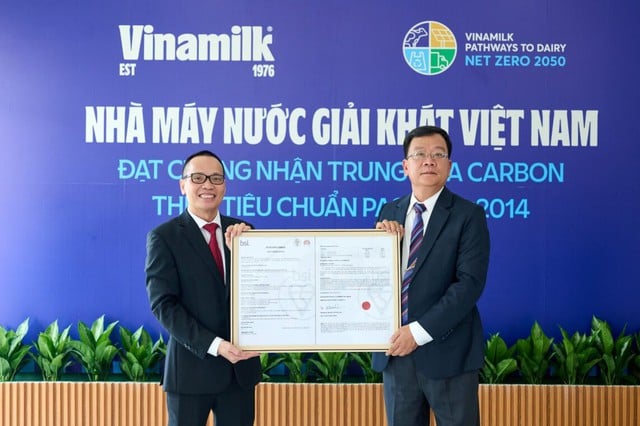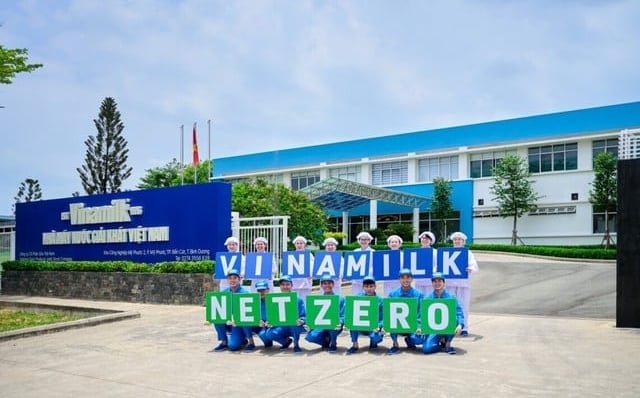May 29, 2025 | 08:31 GMT +7
May 29, 2025 | 08:31 GMT +7
Hotline: 0913.378.918
May 29, 2025 | 08:31 GMT +7
Hotline: 0913.378.918

Vietnam Beverage Factory achieves carbon neutrality according to international standards PAS 2060:2014. Photo: Le Nguyen.
Vinamilk received international carbon neutrality certification (PAS 2060:2014) from the British Standards Institute (BSI) for Vietnam Beverage Factory. According to this certification, the total amount of carbon neutralized at the factory, according to Scope 1&2, is 3,410 tons of CO2.
For many years now, Vietnam Beverage Factory has implemented many green and environmentally friendly production solutions, such as applying green energy and renewable energy, Using modern technology to save energy, such as heat circulation at the product sterilization stage, water circulation at the product cooling stage.
Currently, the proportion of clean, green energy (including solar power and CNG...) accounts for more than 92% of the energy consumed at the factory, and according to the greenhouse gas inventory report, the factory's emissions in 2023 have decreased. 30% compared to 2022. "Going green" efforts have helped the factory meet strict requirements according to international standards such as ISO 50001 energy certification, ISO 14001 environmental certification, and now food safety certification carbon neutral PAS 2060:2014.
"A complete and detailed inventory and emissions assessment will help businesses have the right perspective to build a systematic roadmap to reduce carbon neutrality. It can be said that the practices Vinamilk can be a typical example for businesses on the path to greening themselves and contributing to Vietnam's common Net Zero goal," said Mr. Le Duyen Anh, General Director of BSI Vietnam.
Previously, two other units of Vinamilk, Nghe An Dairy Factory and Nghe An Dairy Farm, were the first units in the dairy industry to achieve carbon neutral certification, according to PAS 2060:2014. Thus, less than a year after announcing "Pathways to Dairy Net Zero 2050", Vinamilk had three units achieving this certification.

Vinamilk's Net Zero programs are well-received and actively contributed to by employees. Photo: Le Nguyen.
Green production is one of four strategic directions identified by Vinamilk to reach the Net Zero goal, including sustainable livestock farming, green production, environmentally friendly logistics, and sustainable consumption.
With many synchronous and comprehensive solutions in all four aspects, Mr. Le Hoang Minh - Production Executive Director and Net Zero Project Head of Vinamilk, said there will be more units that will achieve carbon neutrality in the future close, affirming Vinamilk's determination and determination in minimizing its "Carbon footprint" on the path to Net Zero as committed.
At the Vietnam Beverage Factory unit, in 2023, 6 initiatives to help save electricity and energy were recorded by the factory's employees and have been implemented. In addition, the factory also applies many activities such as using machines to process food scraps into fertilizer for plants, machines to collect and classify product boxes for recycling, and using bicycles/electric vehicles inside the area, browsing and storing documents online instead of printing on paper, etc. helps "green" the working environment.
In parallel with reducing greenhouse gas emissions, Vinamilk has been implementing projects to form large-scale carbon sinks, such as preserving a natural forest area of more than 1,000ha in Xiengkhouang (Laos), regenerating 25ha of mangrove forest in Ca Mau Cape National Park, etc.
Vinamilk aims to cut greenhouse gas emissions by 15% by 2027, 55% by 2035, and reach zero net emissions by 2050.
Translated by Huong Giang

(VAN) FAO’s Director-General addresses the 5th Baghdad International Water Conference.
/2025/05/26/1716-4-nongnghiep-191706.jpg)
(VAN) Chain linkages, technological innovation, and raw material zoning are three strategic pillars for the coconut industry to strongly develop and elevate its position on the global agricultural map.
![Advanced mariculture – an inevitable trend: [4] Accompanied by scientists](https://t.ex-cdn.com/nongnghiepmoitruong.vn/608w/files/sohk/2025/05/13/1941-pgsts-vo-van-nha-140958_717.jpg)
(VAN) According to Assoc. Prof. Dr. Vo Van Nha, Director of the RIA III, the development of advanced offshore mariculture is no longer an option but an essential path for Vietnam’s fisheries sector.

(VAN) Vietnam is intensifying the development of mollusk farming areas that meet international standards, aiming for sustainable growth and enhancing its export position in the global seafood market.
![Advanced mariculture – an inevitable trend: [3] Policy-driven momentum](https://t.ex-cdn.com/nongnghiepmoitruong.vn/608w/files/doanhtq/2025/05/21/0104-0616-0348-nuoi-bien-170339_789.jpg)
(VAN) To ensure the success of offshore mariculture that uses advanced technologies, it is essential to establish supportive policies that inspire both individuals and enterprises to invest with confidence.
![Advanced mariculture – an inevitable trend: [2] Outstanding results](https://t.ex-cdn.com/nongnghiepmoitruong.vn/608w/files/sohk/2025/05/12/4632-4136-nuoi-bien-11-164117_819.jpg)
(VAN) Pilot models of high-tech offshore mariculture in Vietnam, particularly in the South Central Coast region, have demonstrated exceptional economic returns and sustainability, setting a new direction for the country’s aquaculture industry.
![Advanced mariculture – an inevitable trend: [1] Moving offshore](https://t.ex-cdn.com/nongnghiepmoitruong.vn/608w/files/phucpm/2025/05/18/0252-2436-nuoi-bien-6-162148_783.jpg)
(VAN) Mariculture using advanced technology and moving offshore is an inevitable trend, as nearshore areas increasingly reveal limitations.